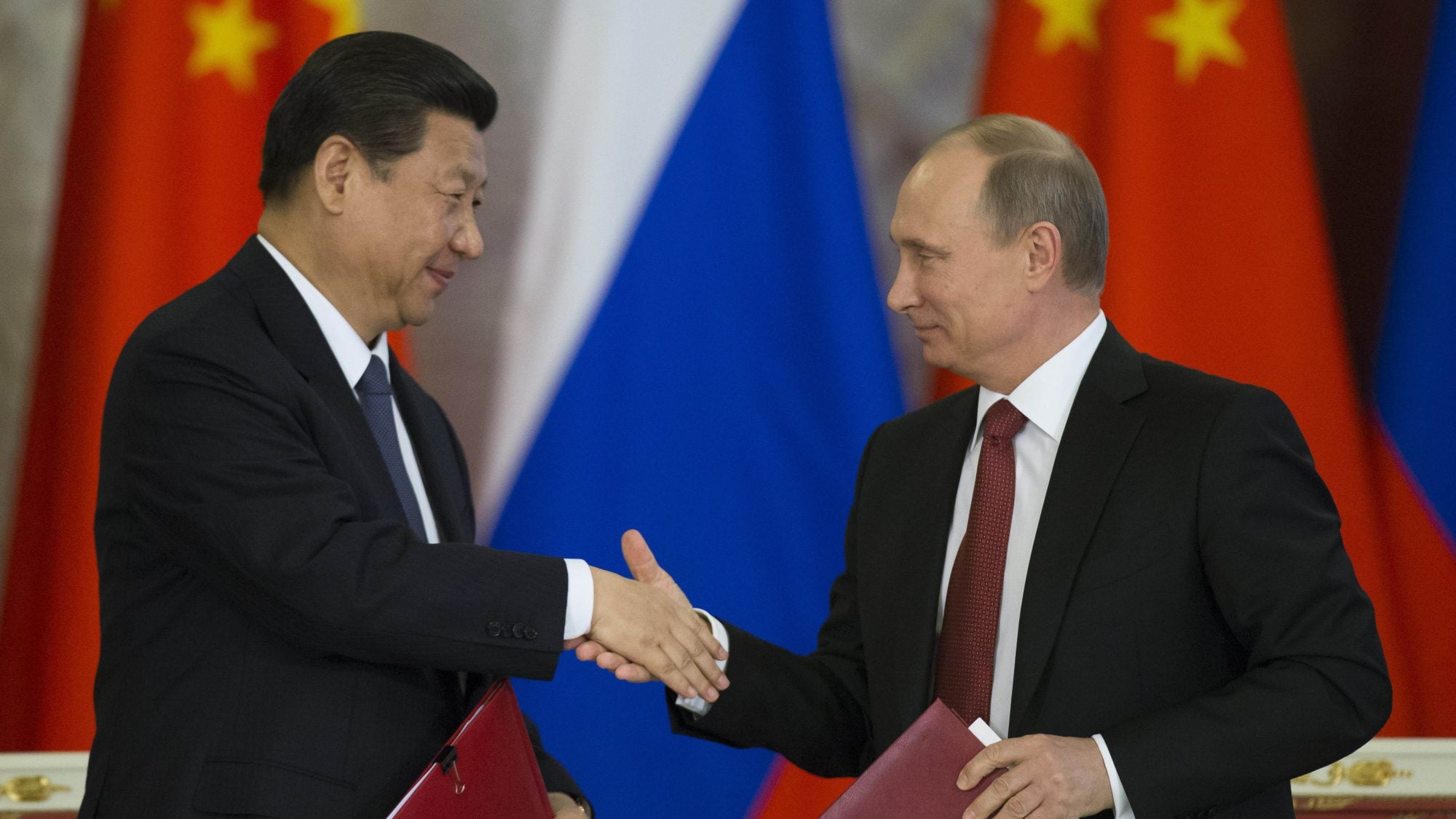
Title: From Moscow to Beijing: Five Minutes with Professors Jason Bruder and Frank Jannuzi
Earlier this week, Georgetown student Eirene Busa interviewed two first-time Georgetown professors, Jason Bruder and Frank Jannuzi, about Russia-China relations. Bruder and Jannuzi work together on the Senate Foreign Relations Committee and are co-teaching a popular new course called “Russia and China: Past, Present and Future.” Bruder, the “Russia hand,” and Jannuzi, the “China hand,” offer their thoughts on why the two countries, or “frenemies,” deserve our special attention.
[GJIA]: This is your first time teaching at Georgetown University. But you are also still working full-time at the Senate Foreign Relations Committee. How are you finding your new schedule?
[FJ]: The hardest thing for me is getting on the 10:30 train to Baltimore after class and getting up the next morning to schlep back to Capitol Hill.
[JB]: For me its realizing that we only have 30 hours to explore with our class a subject you could spend years studying.
[GJIA]: Your course is called “Russia and China: Past, Present and Future.” Could you tell me how you came to this topic? Why do you think it is important?
[FJ]: I thought at first we should call the course the “The Odd Couple” but then I realized that show went off the air before our students were born. But actually the course came about when we realized that many of the issues we work on in the Senate—Afghanistan, North Korea, Energy Security—involve the interests of both Moscow and Beijing.
[JB]: These two powers at the heart of Eurasia are elusive and often difficult for Washington to fully understand. Yet forecasting their behavior, and identifying their motives, are more vital to our future than most of us appreciate.
[GJIA]: Both Russia and China are considered to be BRIC countries, under Jim O’Neal’s characterization from 2000, but their economies seem to be headed on different paths. Where do you see the future of these economies? Is there a chance for increased cross-border investment and cooperation?
[FJ]: If I could accurately forecast China’s economy I would work on Wall Street and not in the Senate. However, it’s a safe bet that China-Russia trade will continue to grow, driven by China’s voracious appetite for raw materials and energy.
[JB]: Both countries possess the elements for a highly developed and complementary economic partnership, but structural problems, historic animosities and competing interests may well impede their relationship’s potential. Whether they rise together or apart economically depends on their ability to overcome these challenges.
[GJIA]: In your course description, you describe the Russian-Chinese relationship as one between “frenemies.” Could you expand on that? What other characterizations would you assign to their relationship?
[FJ]: What is most fascinating about Russia-China relations is that these two great powers, living side by side, could cycle through so many phases of comradeship and hostility over a relatively short historical span. Future ups and downs are inevitable, hence our use of the shorthand “frenemies.”
[JB]: Recent polling in both countries indicates that their publics feel warmly towards each other, and they are interacting to a greater and greater degree. At the end of the day the Moscow-Beijing relationship will always be complicated. By better informing ourselves, Americans can help determine whether this great-power duo tends to align itself in concert, or at odds, with our interests.
. . .
This interview was conducted by Eirene Busa, a masters student in the Center for Eurasian, Russian and East European Studies (CERES) and editorial assistant for the Georgetown Journal’s online content.
Frank Jannuzi serves as Policy Director for East Asian and Pacific Affairs at the Senate Foreign Relations Committee. Before joining the Committee, Mr. Jannuzi worked from 1989-97 at the Bureau of Intelligence and Research at the US Department of State, analyzing political-military developments in East Asia. From 2006-07, Mr. Jannuzi served as an Hitachi International Affairs Fellow of the Council on Foreign Relations in Tokyo, teaching at Keio University and researching Japan-China relations.
Jason Bruder is the Senior Advisor for Europe and Eurasia at the Senate Foreign Relations Committee, where he’s worked since 2007. Prior to joining the committee Mr. Bruder served as a US Diplomat at the State Department, the US Mission to the United Nations, and the US Embassy to the Russian Federation.
Image Credit: Flickr
This is an archived article. While every effort is made to conserve hyperlinks and information, GJIA’s archived content sources online content between 2011 – 2019 which may no longer be accessible or correct.
Recommended Articles

In 1953, Kuwait established the world’s first sovereign wealth fund to invest the country’s oil revenues and generate returns that would reduce its reliance on a single resource. Since…

Cruises have increasingly become a popular choice for families and solo travelers, with companies like Royal Caribbean International introducing “super-sized” ships with capacity for over seven thousand…

In March 2025, widespread protests erupted across Türkiye following the controversial arrest of former Istanbul Mayor Ekrem İmamoğlu, an action widely condemned as politically motivated and…